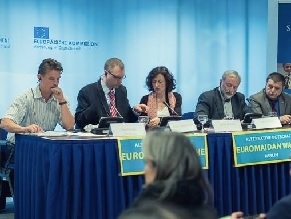|
Euroasian Jewish News

Participants of the discussion at the Eurocommission: Vyacheslav Likhachev, Anton Shekhovtsov, Sarah Reinke, Josef Zisels, and Ali Khamzin
|
EAJC Representatives Speak on Ukrainian Situation in Germany
12.04.2014, Ukraine On April 9, 2014, representatives of the Euro-Asian Jewish Congress spoke on a number of events about the situation in Ukraine and the state of the Ukrainian Jewish community as part of their working visit to Berlin.
The EAJC General Council Chairman, Chairman of the Association of Jewish Communities and Organizations (VAAD) Ukraine Josef Zisels spoke at the Embassy of Ukraine, at a press conference dedicated first and foremost to the current situation with anti-Semitism in Ukraine. Josef Zisels presented the result of the VAAD Ukraine anti-Semitism monitoring program, and compared the data to the results of similar monitoring programs in Russia, France, England, and Germany. “According to the data we have, it is the Jewish communities of Western Europe that seem to require support and protection from anti-Semitism, and not Ukrainian Jewry,” said the Ukrainian Jewish communiyu leader.
On that same day, Josef Zisels, as well as the head of the EAJC program on monitoring and analysis of xenophobia manifestations, the historian Vyacheslav Likhachev (Israel), and the famous expert in radical right movement, political studies scholar Anton Shekhovtsov (Great Britain) had a number of meetings in the German Bundestag. During their talks with representatives of different powers, the experts informed the German politician about the real situation with the Ukrainian Jewish community and the absolutely marginal role that the national-radical forces played both in the processes that took place in Ukraine in recent months and in current Ukrainian social and political reality.
The experts and the Jewish community leader were unanimous in their evaluation of the situation. According to them, the dangers of anti-Semitism and the influence of the radical right in Ukraine have been greatly exaggerated; consciously so - in Russian propaganda, which has also been effective in Europe. According to the experts, the greatest current danger for the Jewish community and Ukrainian society as a whole are the Russian provocations, Russian subversive activity in the southern and eastern regions of Ukraine, and the military aggression, which has already happened in Crimea and which still threatens continental Ukraine. The Ukrainian Jewish community representative and the scholars strongly urged the European politicans to consider reliable information more carefully, to be more sceptical of Russian propaganda, and to react more decisively to the Kremlin’s breach of international law, including being ready to enable effective sanctions against Russia, as Russia is threatening the entire system of collective safety that was created after World War II.
In the evening, a public discussion titled “Ukraine - Threatened by Schism and Radicalization or on the Way to Democratic Consolidation?” took place at the European Parliament Information Office and the German Representative Office of the European Commission. The discussion was organized and initiated by the Schwarzkopf Foundation, the International Renaissance Foundation, the “Kyiv Dialogue” program, and the community initiative “Euro-Maidan Guard.”
The speakers included not only Josef Zisels, Anton Shekhovtsov, and Vyacheslav Likhachev, but also the head of the Mejlis of the Crimean Tatar People External Relation Department Ali Khamzin. The discussion was moderated by Sarah Reinke (Society for Threatened Peoples).
The hall was unable to accommodate all those who wanted to be present and participate in the discussion. Approximately 250 people attended, and about a hundred more were physically unable to fit in the hall.
The experts examined a number of critical issues that the community at large was interested in.
Josef Zisels spoke about the reasons that led to a multi-million campaign of peaceful civic protests, cumulatively known as the Maidan, about the place of the Jewish community in recent events, and about how the new, democratic Ukrainian government treats the Jews.
Ali Khamzin spoke about the problems of the Crimean population after the Russian military aggression and what is in fact the annexation of the peninsula. The speaker gave special attention to infringements on the rights of Crimean Tatars and other Crimean national minorities.
Anton Shekhovtsov spoke about the role of national-radicals in the Ukrainian protests movements, which has been highly exaggerated in the media, and shared information on how the Kremlin is connected to the European radical right. Particularly, the delegation of so-called “observers” to the propaganda event in occupied Crimea, often erroneously called “a referendum” by the media, was staffed by the Kremlin from the ranks of activists and functionaries of national-radical parties.
Vyacheslav Likhachev spoke about the results of the xenophobia monitoring, including attacks motivated by inter-ethnic hatred, in Ukraine and other countries (particularly Russia), and thus uncovered the deceitful and manipulative character of the Kremlin’s arguments about the necessity of protecting Ukrainian national minorities after democrats came to power in Kyiv.
EAJC General Council Chairman Josef Zisels and the experts gave several interviews to German media after the event and before the discussion.
|
